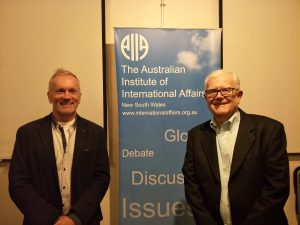Athlete Migrations and the Sport Industries in the Neoliberal Age
On Tuesday 12 June Niko Besnier, Professor of Cultural Anthropology at the University of Amsterdam and Research Professor at La Trobe University, gave us a searching insight into the political and social dynamics of the global sport industries, particularly the effects of athlete migration upon the Global South in rugby, soccer, cricket, marathon running and Senegalese wrestling.
For example in Tonga, where a vast majority of boys have always played rugby, the promise of a career in the sport has taken precedence over other ways of thinking about the future, as traditional forms of making a living in agriculture or the civil service are no longer possible. For many young Tongans, rugby has become a dream of an overseas career. Despite the success of some young Pacific Islanders, for the majority of young hopefuls their rugby dreams will always remain just that, dreams. Brief years of success are followed by lives of alienation.
In Cameroon, the rapid growth of sports academies has attracted countless young men, who leave education aside. This is taking place in a context where young men are no longer able to do what’s expected of them because of the collapse of the economy, namely support their families and achieve adulthood, in a society in which this is predicated on getting married and having children.
Our global neoliberal system is at the heart of these pressures. The sports industries have been transformed into a competitive field driven by capital. The rise of privatised broadcasting has increased the amount of money whirling around sport in a dramatic fashion, facilitating the spread of tantalizing images of global sporting glory to all corners of the globe. The corporatisation of most sports clubs has fuelled their need to search for athletes from the Global South and recruit them at their cheapest.

Niko Besnier with AIIA NSW president Ian Lincoln
In many parts of the Global South, Pentecostal Christianity plays an important role in fuelling the dreams of sports glory and the consequent migrations. For example, many Pacific Islander athletes hold an optimistic belief that God will look after them and help them achieve their dreams. Pentecostalism encourages the faithful to develop the kind of obedient and focused persons that are also valued by the global sport industries. In Senegalese wrestling, many young men cling to the optimistic belief that the purchase of magical paraphernalia from magic specialists – marabouts – will increase their chances of success.
Professor Besnier concluded by reminding us, as consumers of sports, of the effects of the global sports industry on the cultures of these countries. Sports will continue to be viewed as a ray of hope that draws those in poverty away from their countries and families. Sport is in the Global South is deeply intertwined with global transformations, and the first step to holding these transformations accountable is to know about them.
Report by Alexander Tu
AIIA NSW intern